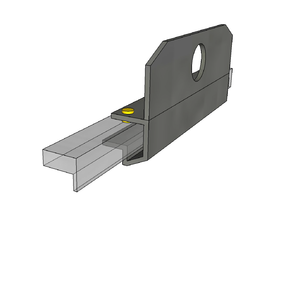In August 2022, CADUS and MetaLab embarked on an ambitious mission: converting an old passenger bus into a Mobile Intensive Care Unit (MICU) that could transport four critically injured patients and up to six patients with minor injuries at once in a secure ambulance. MICU has transported hundreds of patients requiring intensive care in the Dnipro region as of July 2023.
Converting a Bus into a Mobile Intensive Care Unit (MICU)[edit | edit source]
Since the beginning of the Russian war on Ukraine on February 24th 2022, the safety of medical patients and their necessary care in hospitals cannot be guaranteed, especially near the frontlines. Intensive care patients are particularly affected by the situation, as they must be monitored around the clock. Medical evacuation (MedEvac) missions transport patients to safe hospitals in Ukraine or in the European Union. Each MedEvac mission is usually carried out by an ambulance with a crew consisting of a driver and at least one paramedic. Transportation of several patients from the same place would thus require several ambulances and crews. In a huge country like Ukraine, this ties up a lot of the workforce, and stresses the vehicles, which tend to be not built for long distances. To make MedEvac missions more effective, CADUS and MetaLab converted a bus into a Mobile Intensive Care Unit (MICU). The advantage: more patients are transported with fewer staff, using a vehicle that is designed for long-distance travel. The Tolocar team supported the design and planning of the bus, which was later built with financial support of the German Ministry for Foreign Affairs.
MICU could not have been realized without the support of dedicated volunteers from both Ukraine and Germany. The volunteers helped strip the bus of its unnecessary elements while ensuring the preservation of its structural integrity. Over the course of three weeks, they worked tirelessly to install essential components such as electrics, oxygen and water supplies, as well as to integrate the much-needed medical equipment. Amidst the limited space available, they also managed to create practical storage areas and set up a functional nurses station. This endeavor demanded meticulous planning and precise execution, making it a real challenge - but it was also a tremendous success! AS of July 2023, hundreds of patients have been transported with MICU, most of them wounded soldiers. MICU has become a symbol of resilience through solidarity and open innovation.

Stretcher Attachment Bracket[edit | edit source]
The design of the Stretcher Attachment Bracket is critical, as it has to securely hold the stretchers during transportation, ensuring the patients' safety throughout the journey. The team fabricated precise brackets in Metalab’s Makerspace, and shared the designs by Pavlo Marchenko via the full MICU project description on open-source repository Appropedia.
The CADUS Crisis Response Mobile Makerspace (CRMMS)[edit | edit source]
CADUS is a non-profit and independent aid organization based in Berlin. Their projects focus on innovation, sustainability, and developing local capacities based on the needs of the communities they serve. They operate in areas where few other aid organizations are active or from which they have withdrawn. In every aspect of their work, CADUS emphasizes cooperation with local partners, and openly shares solutions and innovations with the public.
The CADUS Crisis Response Mobile Makerspace (CRMMS) is a mobile workshop vehicle that can be used in various situations. CADUS lent this vehicle to the Tolocar project, where it was mainly used for Crisis and Emergency Response - supporting housing and infrastructure (i.e. construction projects), providing rapid assistance after minor damage to buildings. This mobile workshop vehicle could also be used as a mobile production facility for 3D printing and CNC milling to produce (medical) components and solutions on site, although CADUS is yet to explore this use.
Some of the learnings, which CADUS generated through internal reflection sessions, are:
- Specialized vehicles should be used instead of “catch-all” versions.
- A physical workshop (“base”) from which the vehicles can operate is beneficial.
- Close collaboration with local partner organizations and specialized businesses is essential to support the local economy and better understand needs.
- Established systems should be handed over to local partner organizations to build a solidarity network that can provide assistance in various crisis areas.
- A network to exchange knowledge and experiences should be set up and maintained. In the long term, structures from old crisis areas can offer assistance to new crisis areas in a spirit of solidarity and pass on materials that are no longer needed. This deconstructs the hierarchy of donors and recipients, and creates an understanding of a solidarity network that works in different directions.
Solidary, differentiated and humane: CADUS Activities in Ukraine[edit | edit source]
Responding to the crisis in Ukraine, CADUS established a base in Lviv just one month after the full-scale Russian invasion. Since then, they have been coordinating and executing patient transports throughout the country, with a particular focus on Eastern Ukraine since mid-2022. Additionally, they have conducted vital medical and safety trainings and supported local rescue organizations by delivering essential materials, and providing 22 ambulances to bolster rescue efforts.
CADUS's commitment goes beyond immediate aid: they are also focused on strengthening local rescue structures in Ukraine, which mirrors the Tolocar project's objective of supporting rebuilding efforts and fostering the Ukrainian innovation ecosystem in the long run. This is why CADUS collaborated with Tolocar from May to August 2023 by deploying their CRMMS vehicle.
Inspired by the success of MICU, CADUS transformed a truck into a mobile Primary Health Care Unit (PHC), which was handed over to their partner organization BASE UA in February 2023 and has since been deployed near the frontlines. At the time of writing, CADUS is preparing the CRMMS for a mission to provide support to the people affected by the Nova Kakhovka dam break.
Disclaimer: The design of MICU was part of the Tolocar project, while procurement and operations are part of a project supported by the German Federal Foreign Office.

